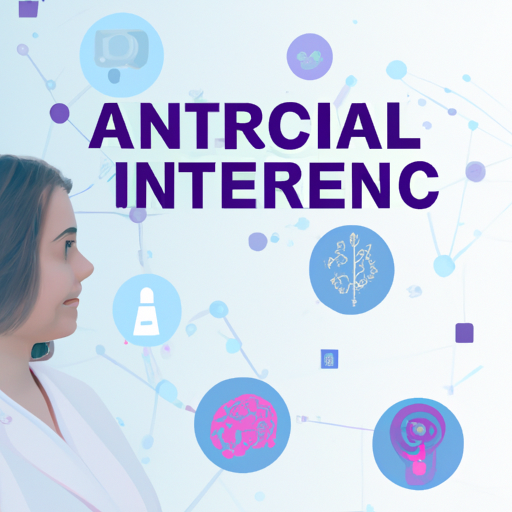
AI in Healthcare: Improving Patient Outcomes with Technology
-
Table of Contents
- Introduction
- How AI is Transforming Healthcare Delivery and Improving Patient Outcomes
- Exploring the Benefits of AI-Powered Diagnostics and Treatment
- The Role of AI in Enhancing Clinical Decision Making
- Leveraging AI to Improve Patient Engagement and Outcomes
- Examining the Impact of AI on Healthcare Costs and Quality of Care
- Conclusion
-Powered Care.
Introduction
The healthcare industry is rapidly evolving with the introduction of artificial intelligence (AI) technology. AI has the potential to revolutionize the way healthcare is delivered, from diagnosis and treatment to patient care and outcomes. AI can help healthcare providers make more accurate diagnoses, provide more personalized treatments, and improve patient outcomes. AI can also help reduce costs and improve efficiency in healthcare delivery. AI is already being used in a variety of ways in healthcare, from medical imaging to drug discovery and development. As AI technology continues to advance, it will become increasingly important for healthcare providers to understand and leverage its potential to improve patient outcomes.
How AI is Transforming Healthcare Delivery and Improving Patient Outcomes
The healthcare industry is undergoing a major transformation due to the introduction of artificial intelligence (AI). AI is revolutionizing the way healthcare is delivered and improving patient outcomes. AI is being used to automate mundane tasks, improve accuracy and efficiency, and provide personalized care.
AI is being used to automate mundane tasks such as data entry, scheduling, and billing. This frees up healthcare professionals to focus on more important tasks such as patient care. AI is also being used to improve accuracy and efficiency. AI-powered algorithms can quickly analyze large amounts of data to identify patterns and make predictions. This can help healthcare providers make more informed decisions and provide better care.
AI is also being used to provide personalized care. AI-powered chatbots can provide personalized advice and support to patients. AI-powered virtual assistants can help patients manage their health and wellness. AI-powered diagnostic tools can help healthcare providers diagnose and treat patients more accurately.
AI is also being used to improve patient outcomes. AI-powered algorithms can analyze patient data to identify potential health risks and provide personalized care plans. AI-powered tools can also help healthcare providers monitor patient progress and provide timely interventions.
AI is transforming the healthcare industry and improving patient outcomes. AI-powered tools are automating mundane tasks, improving accuracy and efficiency, and providing personalized care. AI is helping healthcare providers provide better care and improve patient outcomes.
Exploring the Benefits of AI-Powered Diagnostics and Treatment
The use of artificial intelligence (AI) in healthcare is rapidly becoming a reality. AI-powered diagnostics and treatment are revolutionizing the way healthcare is delivered, offering a range of benefits to both patients and healthcare providers.
AI-powered diagnostics are helping to improve the accuracy and speed of diagnosis. AI algorithms can analyze large amounts of data quickly and accurately, allowing healthcare providers to make more informed decisions about diagnosis and treatment. AI-powered diagnostics can also help to identify potential health risks and provide early warning signs of disease.
AI-powered treatment is also becoming increasingly popular. AI algorithms can be used to identify the most effective treatment for a given condition, allowing healthcare providers to tailor treatments to individual patients. AI-powered treatment can also help to reduce the cost of healthcare, as AI algorithms can identify the most cost-effective treatments.
AI-powered diagnostics and treatment can also help to improve patient outcomes. AI algorithms can identify patterns in patient data that may not be apparent to healthcare providers, allowing them to make more informed decisions about treatment. AI-powered diagnostics and treatment can also help to reduce the risk of medical errors, as AI algorithms can identify potential errors before they occur.
Finally, AI-powered diagnostics and treatment can help to reduce the burden on healthcare providers. AI algorithms can automate many of the tasks associated with diagnosis and treatment, freeing up healthcare providers to focus on more complex tasks.
In conclusion, AI-powered diagnostics and treatment offer a range of benefits to both patients and healthcare providers. AI algorithms can help to improve the accuracy and speed of diagnosis, reduce the cost of healthcare, improve patient outcomes, and reduce the burden on healthcare providers. As AI technology continues to develop, these benefits are likely to become even more pronounced.
The Role of AI in Enhancing Clinical Decision Making
Artificial Intelligence (AI) is a rapidly growing field of technology that has the potential to revolutionize the healthcare industry. AI has the potential to enhance clinical decision making by providing healthcare professionals with more accurate and timely information. AI can be used to analyze large amounts of data quickly and accurately, allowing healthcare professionals to make more informed decisions.
AI can be used to identify patterns in patient data that may not be immediately apparent to healthcare professionals. For example, AI can be used to identify correlations between patient symptoms and treatments, allowing healthcare professionals to make more informed decisions about the best course of action for a particular patient. AI can also be used to identify potential drug interactions and other potential risks associated with a particular treatment.
AI can also be used to provide healthcare professionals with more accurate diagnoses. AI can be used to analyze patient data and identify potential diagnoses that may not have been considered by healthcare professionals. AI can also be used to identify potential treatments that may be more effective than those currently being used.
AI can also be used to provide healthcare professionals with more accurate predictions about the outcomes of treatments. AI can be used to analyze patient data and identify potential outcomes that may not have been considered by healthcare professionals. This can help healthcare professionals make more informed decisions about the best course of action for a particular patient.
Finally, AI can be used to provide healthcare professionals with more accurate and timely information. AI can be used to analyze patient data and identify potential trends that may not have been immediately apparent to healthcare professionals. This can help healthcare professionals make more informed decisions about the best course of action for a particular patient.
In conclusion, AI has the potential to revolutionize the healthcare industry by providing healthcare professionals with more accurate and timely information. AI can be used to analyze large amounts of data quickly and accurately, allowing healthcare professionals to make more informed decisions. AI can also be used to provide healthcare professionals with more accurate diagnoses, predictions, and trends. By utilizing AI, healthcare professionals can make more informed decisions about the best course of action for a particular patient.
Leveraging AI to Improve Patient Engagement and Outcomes
The use of artificial intelligence (AI) in healthcare is rapidly becoming a reality. AI has the potential to revolutionize the way healthcare is delivered, from improving patient engagement to improving patient outcomes. By leveraging AI, healthcare providers can better understand and respond to patient needs, leading to improved patient engagement and outcomes.
AI can be used to improve patient engagement by providing personalized care. AI-powered systems can analyze patient data to identify patterns and trends, allowing healthcare providers to tailor care plans to individual patients. AI can also be used to provide personalized health advice and reminders, helping to ensure that patients are taking the necessary steps to maintain their health.
AI can also be used to improve patient outcomes. AI-powered systems can analyze patient data to identify potential health risks and provide early intervention. AI can also be used to monitor patient health and provide real-time feedback to healthcare providers, allowing them to make more informed decisions about patient care.
Finally, AI can be used to improve the efficiency of healthcare delivery. AI-powered systems can automate administrative tasks, freeing up healthcare providers to focus on providing patient care. AI can also be used to streamline the process of collecting and analyzing patient data, allowing healthcare providers to make more informed decisions about patient care.
In summary, AI has the potential to revolutionize the way healthcare is delivered, from improving patient engagement to improving patient outcomes. By leveraging AI, healthcare providers can better understand and respond to patient needs, leading to improved patient engagement and outcomes.
Examining the Impact of AI on Healthcare Costs and Quality of Care
The impact of artificial intelligence (AI) on healthcare costs and quality of care is a topic of increasing interest in the medical field. AI has the potential to revolutionize healthcare by providing more accurate diagnoses, reducing costs, and improving the quality of care.
AI can be used to analyze large amounts of data quickly and accurately, allowing for more accurate diagnoses and treatments. AI can also be used to identify patterns in patient data that may be indicative of certain diseases or conditions. This can help healthcare providers make more informed decisions about treatments and reduce the risk of misdiagnosis. Additionally, AI can be used to automate certain tasks, such as scheduling appointments and ordering tests, which can reduce administrative costs and improve efficiency.
AI can also be used to improve the quality of care. AI-based systems can be used to monitor patient health and provide personalized care plans. AI can also be used to provide more accurate and timely diagnoses, which can lead to better outcomes for patients. Additionally, AI can be used to provide more personalized treatments, such as personalized drug regimens, which can improve patient outcomes.
Finally, AI can be used to reduce healthcare costs. AI-based systems can be used to automate certain tasks, such as scheduling appointments and ordering tests, which can reduce administrative costs. Additionally, AI can be used to identify patterns in patient data that may be indicative of certain diseases or conditions, which can help healthcare providers make more informed decisions about treatments and reduce the risk of misdiagnosis.
In conclusion, AI has the potential to revolutionize healthcare by providing more accurate diagnoses, reducing costs, and improving the quality of care. AI-based systems can be used to automate certain tasks, identify patterns in patient data, and provide more personalized treatments, all of which can lead to improved patient outcomes and reduced healthcare costs.
Conclusion
AI in healthcare has the potential to revolutionize the way healthcare is delivered and improve patient outcomes. AI-driven technologies can help healthcare providers make more accurate diagnoses, reduce medical errors, and provide personalized treatments. AI can also help reduce costs and improve efficiency in healthcare delivery. AI-driven technologies are already being used in healthcare, and the potential for further development is immense. With the right investments and support, AI can help healthcare providers deliver better care and improve patient outcomes.








